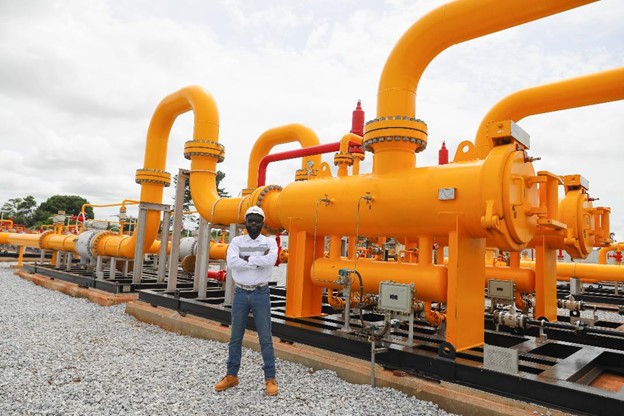Genser Energy, a leading energy company in Ghana, has constructed 110 kilometre of natural gas pipeline in record speed.
Despite prevailing challenges such as global supply chain disruptions caused by the aftermath of COVID-19 and the Ukraine/Russia conflict, as well as national economic hurdles and inflationary pressures, the company demonstrated its unwavering commitment to progress by completing the project within five months.
The commissioning of this expansive pipeline network carries immense socio-economic implications on a national scale. It is expected to significantly reduce power transmission losses that currently affect the country. Moreover, the integration of the pipeline will facilitate the provision of cheaper gas for power generation. This development positions Kumasi as a key hub for future development initiatives and employment opportunities.
For more than 15 years, Genser Energy has played a pivotal role as an independent power producer (IPP), spearheading the development of an extensive pipeline network spanning 430km. The magnitude of this endeavor has been made possible due to the exceptional dedication exhibited by the Genser Energy staff. In a testament to their commitment to local content laws, the construction of the latest phase of the pipeline was entrusted to a group of young engineers, with an average age of 32, of which 85% were Ghanaian.
Henry Abeiku Oppong, the Project Manager of the engineering, procurement, and construction (EPC) team, joined Genser Energy as an entry-level employee in 2013. His rise within the company is emblematic of Genser Energy’s commitment to training and providing opportunities to young engineers. Henry expressed his satisfaction with the successful completion of the project, stating, “It is an honor to be part of this transformative endeavor, which will leave a lasting impact on the nation’s infrastructure and the lives of its people. Together, we have built a legacy of teamwork and resilience, driven by a shared commitment to excellence and collaboration. This success fuels our optimism for Ghana’s bright future in the energy sector” said Mr. Abeiku Oppong.
The EPC team comprised 40 full-time Genser Energy employees, while an additional 220 contractors were engaged specifically for this project to ensure its timely and budget-conscious completion. Over 12,000 steel pipes had to be purchased, delivered and assembled to complete the project. “Throughout the project, my utmost priority was to ensure that every aspect adhered to the highest standards of Quality Assurance and Quality Control. From meticulously verifying incoming materials to meticulously preparing essential documents such as the Inspection Test Plan (ITP), test reports, and the construction dossier, we left no stone unturned in maintaining the project’s integrity and meeting all specifications” said Edward Lotsi, Quality Assurance and Quality Control Superintendent.
Since 2018, Genser Energy has constructed a total of 430km of natural gas pipelines. By closely collaborating with Ghanaian regulatory bodies, Genser Energy has not only expanded its operations but has also contributed to the growth of the national economy.
Throughout the construction and land acquisition process for the 110km pipeline corridor, Genser Energy recognized the importance of fostering strong relationships with the communities affected by the project. The company’s dedicated community relations team worked closely with local farmers, landowners, and traditional councils to ensure open lines of communication and a collaborative approach.
Moreover, Genser Energy is committed to implementing sustainable measures in its operations. Environmental considerations and social impact assessments were conducted to ensure that the construction and operation of the pipeline adhered to national and international sustainable practices. The company strives to minimize any adverse effects on the environment and local communities, aiming for a long-term balance between economic development and environmental preservation.
The newfound accessibility to cheaper gas has prompted other power producers to seize the opportunities presented by this evolving landscape. Several independent power producers are now planning to establish power plants in the region, with a cumulative capacity of up to 1030MW. This surplus electricity has the potential to be transmitted to the national grid, thereby serving areas that currently face power shortages.
As Ghana continues to prioritize private sector engagement and uphold good governance practices, it is expected that more companies will be inspired to invest in the country, bringing about further economic prosperity and societal advancement. The collaborative efforts between the Ministry of Energy and the private sector will undoubtedly play a pivotal role in shaping Ghana’s sustainable development journey.
The expansion of the pipeline network is expected to foster the development of new industries in the Ashanti region, further bolstering local economic growth and job creation. Genser Energy’s dedication to innovation and progress continues to position Ghana as a leading player in the energy sector, setting the stage for a prosperous future.










